'Game on:' The unique rise of Joe Theismann
A father's (painful) lesson. Long odds at Notre Dame. Pissing off Don Shula. Cracked ribs & collarbones. Yes, the Washington Redskins great has many stories to share. Here's the full transcript.
The younger generation knows Joe Theismann best for his analysis of the modern game, but for a brief period in the early 1980s? He was on top of the NFL world.
As a player, Theismann is one of the most underrated stars of his era.
That’s because his NFL career took a while to get rollin’ — Theismann spent his first three years in the CFL and needed to wait four years to take over as the Washington Redskins’ full-time starter. Then, of course, his career ended prematurely at the hands of Lawrence Taylor. But in-between? Theismann led the Redskins to a Super Bowl title in 1982 and was named the league’s MVP in 1983.
That offense scored more points (541) than any team in NFL history at the time.
He also played in 163 straight games. Not easy when quarterbacks were punching bags.
Theismann — a “wiry” quarterback who took immense pride in slaying doubters — has many words of wisdom to share on this week’s episode of the Go Long Pod.
The full transcript is below if you prefer words.
Audio and video is available here, icymi:
Dunne: Super Bowl champ. NFL MVP. You’ve been told you’re “too small, too little, too this, too that” your whole life. This newer generation, they’re not as familiar with Joe Theismann — the player, the competitor. We hear you breaking down the game, but your origin story is one of the best I’ve ever heard. First of all, how in the hell are you doing? You said you just got off the plane to make a little time for Go Long.
Theismann: Yeah, I was in Jackson Hole, Wyoming a couple days ago, and I had an opportunity to speak at the Jackson Hole Classical Academy fundraiser. It’s an incredible school out in Jackson Hole, Wyoming. And they’re doing some magnificent things out there with the kids as far as their education goes. A Christian-based school and the kids are really special. It’s small, but it’s going to continue to get bigger and bigger. And then I just literally got off the plane. I flew from there to Palm Springs and just did the California Bankers Association meeting yesterday morning. And so here I am, back home in Virginia for a little while.
Dunne: So you’re staying active. That’s got to be good to keep the brain working fast.
Theismann: Yeah, I really enjoy it. I wrote a book called “How to Be a Champion Every Day.” And basically the essence of the speech is what I talk about in the book. All of us need to set goals for ourselves and write ‘em down. Anything we do, it depends on the attitude that we bring to whatever our endeavor is. And then there’s that element called people-people relationships, or in business they call it customer service. And then I delve a fair amount on teamwork and leadership, and we all find different ways to get ourselves motivated. I drive my wife nuts because my feet hit the floor in the morning and I’m ready to rock and roll. And we’re two different people that way, but I really enjoy telling stories. There aren’t too many people that have a one-yard punt in the National Football League, of which I’m a record-holder. Very honored to say. Lots of crazy stuff going on.
Dunne: As a Dad myself, I was blown away by the stories of your childhood in New Jersey and that lesson your Dad taught you at a very young age. Can you share that story on the moment where you learned, “OK, I’m not going to talk back to my Dad ever again.” And then you referred to him as your “hero.” That relationship is special.
Theismann: So what happened with my father and I, we were building a little room for me upstairs where I would sleep because I had gotten older now. I used to sleep in a room with my younger sister and then all of a sudden went upstairs and we were putting up sheet rock and I mouthed off to my dad. And the next thing I knew, my head was through the sheet rock and I never said another word to my Dad again. He made his point and I got it. But really, my Dad was my hero because he worked 13 hours a day, six days a week. He would come home on Sunday, which was a day off. We’d come home from church and he would plop down in his easy chair and was just lights out. And I’d run up to him and say, “Hey, come on Dad! Come on Dad, let’s go throw the ball around!” He’d get up out of that chair and he’d come out, throw the ball around with me for a few minutes and my buddies would come by. I lived two blocks from my high school. The guys were headed up to the high school and said, “Come on Joey, let’s go. We’re going up to play.” And I’d say, “Hey Pop, here’s the glove. Here’s the ball. Catch you later.” I mean, I wasn’t out there 10, 15 minutes. And that happened year after year, time after time. And never once did my father ever say to me — when I tried to wake him basically out of his sleep — “Joey, I’m tired. I just really can’t get up today.” Never once did he ever deny me the opportunity to be with him, even if it was for a short period of time. But he was always willing to get up out of that chair and be there with me. That’s my hero.
Dunne: Because he’s working all the time at a gas station and a liquor store.
Theismann: The liquor store, he owned it. Well, he worked at the gas station for a long time and then he worked at the liquor store for over 20 years. And they were open from nine in the morning til 10 at night, and he’d come home at 10 at night. I was allowed to sort of stay up and say goodnight. We were about 15 minutes from where he worked. He used to get an hour for dinner. He’d leave the store at 5 o’clock, be home at 5:15 and go back to the liquor store at quarter to 6 and be there. So I had a half-hour with my dad at dinner, but I cherished and relished every moment that I had the opportunity to spend with my father.
Dunne: What does it feel like when your head goes through sheet rock? I think the pain would stick with you.
Theismann: I was praying there wasn’t a beam on the other side.
Dunne: Right. Your Dad was playing sheet-rock roulette.
Theismann: It happened so quick. You don't know. You know how things happen and all of a sudden you take a step back and you go, “Wow, I can’t believe that happened.” It taught me a lesson, though. Taught me a lesson.
Dunne: We are building a house, but I think I might hold off on that kind of corporal punishment with the little ones. We’ll think of other methods.
Theismann: I don’t recommend it, let’s put it that way.
Dunne: And so through high school, obviously colleges wanted you, right? You were the starting quarterback. Undefeated. State champ, all that stuff. But you’re 5-11, 152 and the newspaper there in Newark, New Jersey says, “Joe Theismann, he’s going to get killed out there in Notre Dame.” You’re one of 13 quarterbacks at Notre Dame.
Theismann: At that school, I was one of 13. Matter of fact, it was my second choice in schools. I signed with North Carolina State originally, but there was Wake Forest, the University of North Carolina, Penn State, Notre Dame, Wake and NC. Those were the five schools. And for me, it was like, “OK.” My high school coach backed up Roman Gabriel at North Carolina State, and I thought, “Hey, that’s a great reason to go to that college.” Well, who knows why you make those decisions? So this was a reason for me to go and I signed. But Notre Dame, as an independent, it wouldn’t affect my eligibility. Because if you signed at another school after you signed your grant and aid, you’d lose a year of eligibility. Well, I wouldn’t because they’re an independent. Flew out to Notre Dame and a guy by the name of Rocky Bleier was my host. Went around campus, played some basketball, met with the coaches, flew back home. My Dad says, “What do you think?” I said I have to go to Notre Dame. He says, “Why?” I said, “Dad, it just feels right.” And I contend this, Ty. If we made decisions based upon our gut, we’d probably be right a higher percentage than if we just take time to analyze it and try and convince ourselves or try and talk ourselves into it, try and talk ourselves out of it. And so, I trusted my gut and it turned out pretty darn well.
Dunne: If anybody takes anything from this conversation, I hope it’s that. Isn’t it true? There’s really a science to it. We always come back to Simon Sinek’s “Start With Why.” That’s the point that he makes — the limbic brain. We can’t really pinpoint what that is, but it’s the gut feeling. Whatever that first instinct is, trust it, go for it, believe in it, and don’t look back. And that’s kind of been a theme throughout your life it seems.
Theismann: It has. Things have worked out. It’s like when I made the decision to go and play in the Canadian Football League for the Toronto Argonauts. I got drafted by the Dolphins. It didn’t work out that well for me in conversation. Ultimately, they changed the contract I wanted — but I tried do it myself (without an agent). And this was the mistake. When you try and do sort of big negotiations yourself, the emotions get involved and the emotions don’t allow you to sort of rationally step back and take a look at the whole picture. And so for me, I never regret going to Toronto. I loved being up there. We went to a Grey Cup in 1971. They’ve won five I think since then. The Argonauts have been one heck of a football team. They won it this past year, and I’m so proud to be an Argonaut and have the opportunity to have played in the city of Toronto. The people were wonderful. It’s a spectacular city. It really is. And then I came back here to Washington and sat for a while, returned punts for a while. I did a little bit of everything here.
Dunne: The instinct to just trust it, believe it, take action, that goes all the way back to your Mom — she didn’t want you playing football. So you bring your buddy over and you show your Mom, “Look, here’s my buddy. He’s got all these pads on. I can play. It’s OK.” I mean, if you don’t do that, who knows?
Theismann: Tommy Bara, was my buddy. It’s so funny. I think back to the days when we were in high school and Pop Warner football. Our tackles in high school were 180 pounds. That’s all it was. Now they’re 280 on the small side when you look at the young guys in high school football today. And Tommy came dressed in a uniform to convince my mom to let me play. So I started playing at the age of 12. Really started playing baseball when I was eight years old. It was always my first love. When we finish this tonight, our conversation, I’m going to find a baseball game and just go do some work and put the baseball game on. Let it keep me company.
Dunne: And you’re one of 13 quarterbacks there in Notre Dame, and I think the key was that you got there a week early. So Notre Dame takes all these quarterbacks in and kind of puts ‘em at different positions — DBs, running backs, linebackers, whatever. Being frail worked to your advantage because they’re like, “We can’t put little Joey Thees-man, at that time, anywhere else.” But you knew, “If I get there early and bust my ass, anything’s possible.”
Theismann: I’ve always liked knowing things, getting an idea of what’s going on before I get into stuff. And as far as being able to go to Notre Dame early, I knew there’d be a bunch of them. And if you can get to the front of the line and at least show ‘em what you got, you have a chance. And as small as I was, I didn’t know if I’d get that opportunity, but I tried to seize it. Back then in ‘67, which now is the dark ages of life, I guess, for a lot of young people: “Sixty-seven? Was that an actual year? Was that right after the dinosaurs stopped roaming the earth?”
They’d take the best athletes out of high school. You become a defensive back, a wide receiver, a linebacker, running backs. Guys did everything. Except you’re right, I was just a skinny little kid. So, I wound up being a quarterback and Ara Parseghian was my coach, and it was an incredible experience. Scared to death of the man. He scared the living daylights out of me. No reason in particular. He never said anything to me. Just his presence was such that when I went in his office, it was like, “Oh God.” Somebody would come and say, “Coach wants to see you.” And I’d I go, “Oh, God.” And then now your mind starts to wander. What did I do? How are my grades? Is everything okay? What’s he going to tell me? You go through all these scenarios and it's just “Hey, Joe. I wanted to check on you. How’s the family?” You walk out of there and go, “Whew. Dodged a bullet.”
Dunne: But where did your confidence come from, Joe? Because it’d be really easy for all of this to bury you and become suffocating. Big Notre Dame. Headlines in the paper: “He’s going to get killed.”
Theismann: I’m wiry. I’m wiry.
Dunne: That’s the word.
Theismann: I’m a lean, wiry individual. That’s the way I referred to Jayden Daniels. People said he’s so thin, he’s so little. He’s lean and wiry. Tom Brady was wiry. Wiry guys last longer than guys that are heavy and are big targets.
Dunne: What was the advantage to being wiry then?
Theismann: Well, my wide receiver in high school was Drew Pearson. He’s still wiry. God bless him. But no, the confidence came with this. I enjoyed success early in my life. I was gifted athletically. So whether it was playing football or basketball or baseball. When I was younger, when I was 12, I was playing with guys that were 15. When I was 14, I was playing with the guys that were 17. And if you hold your own, it’s like, “Hey, you know what? I can do this.” And then you start to believe. I contend this. If you don't believe in who you are, who’s going to believe in you? It’s one of the things I talk about in my presentations. But where does it come from? There’s the anticipation of moments. There’s the education to have enough knowledge to be able to know the things you need to know. And then, oh by the way, there’s this thing called ability.” A lot of people are born with a natural ability. I still think the greatest gift that anyone can have is mental toughness. I don’t care what walk of life you’re in, I don’t care what business you’re in. I don’t care what sports you play. If you're mentally tough, you have a chance to succeed. People were always saying, “You can’t do it.” You can call it spite. It was just a great amount of pride in saying I could get it done. Heck, my Mom was my wide receiver. My Dad worked all the time. Mom would come home and she was my pitcher when I pitched. She was my catcher. Mom was a good athlete.
Is mental toughness something that you’re born with or did you acquire over time?
Theismann: I think you can develop it. I think it’s almost like tempering a sword. If you pound it the right way, it’s either going to break or it’s going to get stronger and stronger. And in my case, like I say, you can call it “spite.” You can call it “pride.” When somebody said I couldn’t do something, I was bound and determined to prove ‘em wrong. To me, if you want to challenge me to do something, tell me I can’t do it. Or tell me I don’t have the ability to do it or tell me it can’t be done. And then to me, it’s game on. And then what do I need to do? And then for myself, it’s what do I need to do, to be able to complete this task? What do I need to do to get where I want to get to when it comes to me being able to do the things that I’d like to accomplish in my life.
Dunne: So it probably is quite an experience when you get to that NFL draft and fall to the fourth round. You’re not expecting that. You’re told you’re going to be a top 15 pick, and why wouldn't you be? You almost won the Heisman — tweaking the pronunciation of your name, which is a great story. You went from “THEES-man” to “THISE-man.” With grandmother's blessing, of course. But to fall on the draft and then there’s some bad blood with Miami. You could’ve been really spiteful to where “OK, I fall on the draft and now it’s getting strange with Miami and that negotiation, and I land in the CFL and I’m watching Miami win these Super Bowls, and that could be me.” You’ve got to maintain self-belief through all of that.
Theismann: You forget, you’re 21 years old, and what do you have to be spiteful about? I was disappointed. And the reason I was disappointed — it’s funny when it comes to the draft. It’s so much different now than it was when we were drafted back in 1971. That class had Jim Plunkett, Rex Kern, Dennis Dummit, Archie Manning, Dan Pastorini. That was the ‘71 graduating college class of quarterbacks. Pretty good collection of guys. For me, what it really boiled down to was that I was going to try and be there. But what happens is people start to tell you that you’re going to go here or you’re going to go there and you start listening to the people. We just saw it with Shedeur. The talking heads were going nuts as each round went by and he didn’t get taken. They were more disappointed than he was where he wound up going. They couldn’t believe that they were wrong. They were so wrong that they had him in this place and it didn’t work out. But that’s the draft.
But for us, the Giants said, “Hey, if you’re around in the first round, we’ll take you.” The Cowboys said, “If you’re around the first round.” And I listened and I sat in Roger Valdiserri’s office, our PR guy. And I sat through the first round, no phone call. Sat through the second round, no phone call. Third round rolled around. I said, “Roger, if you want me, I’ll be down playing basketball. Come and get me.” I wasn’t going to sit around and wait. Miami had to give up their No. 1 pick to the Baltimore Colts to get Don Shula to coach in Miami. So they only had three picks. So I was actually the third pick, but I was a fourth rounder. And so I get the call and they say, “You’ve been drafted by the Miami Dolphins.” Well, they got a guy by the name of Bob Griese there, too. But the competition never concerned me. So I flew down to Miami, met with Mr. Robbie. Joe Thomas was their GM. He was having heart surgery. So I met with (the team’s owner) Mr. Robbie. He says to me, “What do you want?”
First lesson in negotiations, never quote a price. I didn't know that. I think I’m smart, but I’m not. So this was the price: $35,000, $45,000, $55,000 with a $35,000 signing bonus broke down over three years. OK, that’s what we’re going to do. And then he said, “OK.” And I went, “Oh geez. Alright.” So they send me the contract. They had me paying back the bonus if I didn’t show up for any of those three years, and I just said it was wrong. So the negotiations dragged on. Leo Cahill, who was coaching the Toronto Argonauts said, “Fly to Toronto. We want to sign you.” Flew up there. They offered me 50, 50, 50. I’d be the highest-paid player in the Canadian Football League at that time. And I signed the contract. He said, “If you leave the country, it’s off the table.” I signed it, flew back to South Bend. Ara calls me at 6 a.m. in the morning and says, “What in heaven’s name have you done?” I said, “I signed with the Toronto Argonauts.” He says, “I know. Shula’s on the plane right now. He’s coming up. He wants to meet with you.” I said, “Oh boy. I’m going to get myself in trouble now.” And basically, I did. Coach Shula was not very happy with me, and he read me the Riot Act, and it was one of three different instances where I had a chance to see that it didn’t work out well for Coach Shula. That was the first one. Second one was Super Bowl 17, and the third one — I actually broadcast with Don Meredith and Frank Gifford — Super Bowl 19, when they played the San Francisco 49ers in Palo Alto. And they lost that one. So Shula wasn’t real excited to see me whenever I showed up, to be honest with you.
Dunne: Yeah, Shula probably held a grudge for a while. Was that relationship a little icy for several years?
Theismann: You could say that.
Dunne: Did you guys ever sing Kumbaya?
Theismann: We were cordial. I was always cordial and respect him tremendously. People said, “Do you ever have any regrets?” The only regret I really ever have had in football was I didn’t get a chance to play for Coach Shula, but it was my choice. So there’s nothing I could do about it. I just chose to go a different direction.
Dunne: Well, it was meant to be. Who knows what happens? I guess you can look at it and say, “Well, he could have been on that (1972) undefeated team because Griese got hurt that year.”
Theismann: Griese got hurt. Earl Morrall quarterbacked nine of those games. So this is what I say to the Miami Dolphins fans, OK, real simple. If I had been the quarterback, I don’t know if I’d win nine games. I don’t know if we’d go undefeated. I don’t know if we’d win a Super Bowl, but Earl did. So to all those Dolphin fans that get mad at me for not being a Miami Dolphin. All I have to do is say, thank you. That’s all you need to do is thank me for not going. That’s all. I wasn’t there to mess the whole thing up.
Dunne: Let’s jump into those Washington Redskin days. Like I said, Super Bowl Champ, MVP, you were 77-47 as a starter. One of the winningest quarterbacks ever. But when you get there initially — Sonny Jurgensen is still kicking around. You’re coming in and saying, “Hey, I’m competing to win this job,” because you’ve got that belief in yourself that you have to have at that position. And how did you kind of take the reins and make the Washington Redskins Joe Theismann’s team?
Theismann: Well, George Allen traded a No. 1 pick to Miami for me. So I actually wound up being a first-round pick in a roundabout way. Billy (Kilmer) and Sonny were the quarterbacks here. I came to town and said “I didn’t come to sit. I came to play.” That didn’t sit very well with them. The locker room was a different locker room. It was the most union locker room. It was the oldest locker room in football. Coach Allen brought a lot of guys from the Rams to Washington. And I was a young kid. So I started my career at Notre Dame as a punt returner. I returned punts in the Canadian Football League. And so after practice, I just kept myself busy by returning punts. That’s what I did. I just went out there and returned punts and had a heck of a good time.
I love every element of football. Heck, I used to run scout team wide receiver. When I was in broadcasting, I used to go up to Seattle and Mike Holmgren let me cover kicks. Rusty Tillman was the special teams coach. Rusty had played with me in Washington, and I covered kicks up in Seattle. I loved the game. I loved every aspect of the game. And so ‘74, ‘75, ’76 played a little bit, ’77 very little. And in 1978, Jack Pardee took over and I became the quarterback. And you can’t hide on a football field. You can’t hide in a locker room. The people know who you are. The guys know if you can play or you can’t play. The guys know if you can handle pressure or you can’t handle pressure. The guys know if you have the mental capability to be able to play the position or not. You can’t hide that stuff in football. It’s going to show up sooner or later. And if you can weather the storm and be tough enough to handle the things that you need to, then you have a chance — at every position.
Dunne: How do you play 163 straight games in that era? It’s a different football. For people who have no clue what football’s like in the 70s. I always love talking to players from that era, and you hate to throw around war analogies, but those get thrown around. It was a different game.
Theismann: It was.
Dunne: What was it like and how in the hell did you play 163 in a row?
Theismann: Well, I was lucky. I played with broken bones. You just don’t let little things like broken ribs and broken collarbones keep you from playing. Because if I didn’t play, someone else would go out there. And if he played well? You’d lose your job. So it wasn’t a question of, “Well, we’re paying this guy a lot of money. Let’s sit him for a few weeks. Let’s let him heal, and then let him go play.” Uh-uh. It’s truly like the situation that we saw in New England with Drew Bledsoe and Tom Brady and like we saw with Alex Smith and Colin Kaepernick. You open that window for the other guy, and he does well? Coaches will say, “It’s his job. Injury’s not going to make him lose the job.” Bologna, bologna! If you’re a starter and you miss three games and the other guy wins three games, you’re on the bench. Now what you’ve got is a starter on the bench waiting to get back in the game, but you got somebody who’s winning games. No coach is going to throw somebody back in there because their job’s at stake. And so for me, it was just a question of being able to have a great offensive line, a great running game for a number of years, the latter years. And I had a tremendous football coach. The thing that made Joe Gibbs so special — and I think this is part of it — is Joe established a system that took advantage of the qualities of the guys that played the game. John was our hammer. Joe Washington was the third-down back. John could have been, but he was our hammer. Joe and Nick Giaquinto were the guys that came out of the backfield. Art Monk was our move guy. Charlie Brown was our speed guy. Alvin Garrett and Virgil Seay, they were the guys that made it happen in shorter routes. Donnie Warren, Doc Walker, Clint Didier, these were the tight ends.
Everybody contributed in some way, shape, or form. And what people forget in 1983 — the year we launched to the Raiders (in the Super Bowl) — we scored more points than anybody in the history of football at that time: 521. And our giveaway-takeaway ratio was +43. Think of that. You get to 17 or 18 today, you are the No. 1 defense in football. You’re on probably one of the most high-powered offenses in football. We were +43 in that year.
So how do you wind up playing a lot of ball games? I tried to take care of myself. You tried to be smart and not take the big hits. But of course they were unavoidable back then. I remember Ted Hendricks out at Oakland-Alameda Stadium. We’re playing the Raiders. He picked me up and tried to plant my head in the ground. He thought it was a tree. Boom! He was going to plant my head in the ground. You’d get hit late. You’d get pushed to the ground. I think there are things that, to me, I think the game can be a little bit better. And one of the things is if a quarterback gets pushed to the ground by a defensive guy, that’s not a roughing penalty. That’s not a 15-yard penalty. That’s part of the game of football. It doesn’t happen that frequently, but it doesn’t need to be called. And the other thing about football — from a reception standpoint — I’m doing rules right now. From a reception standpoint, if the ball touches the ground in any way, shape or form, it's incomplete. We don’t need to go to replay and say, “Did it move here? Did it move a little bit there?” Half the time, you can’t tell anyway. If touches the ground, it’s incomplete. Make it simple. The rules tend to make the game so complex and it doesn’t need to be. It really doesn’t. And I think the fans would love it, too.
Dunne: That’s typical governmental bureaucracy, right? You kind of invent all these rules.
Theismann: I’m not going there. I’m not going there.
Dunne: Yeah, we’ve got some DC listeners. I better know my audience.
Theismann: One more thing, too. Coaches should be able to challenge every play. You don’t get any more challenges, but you can challenge every play. As a matter of fact, I believe this year they’re going to place an emphasis on if facemasks are missed, the booth is going to have the right to be able to make that call. But to me, leave it in the hands of the coaches. You only get two challenges. You don’t get more challenges. It’s not going to slow the game down, but just challenge everything. Why not? Instead of having this menu of “Yes, it is. No, it isn’t.” As an announcer, it’s hard to figure out what’s challengeable or not. So make it simple.
Dunne: Which injury are you most proud that you played through? Broken bones? I mean, when you look back at that 163 — and how in the hell that was even possible — was there something you played through when you were worried about that person breathing down your neck and you’re like, “I’m not letting this guy take my spot?”
Theismann: I was always very conscious of being able to go to practice on Wednesday. We had Tuesday off. You had victory Monday, and then Tuesday’s installation. And sometimes, we’d have Monday and Tuesday. Probably the one against the Cowboys when I cracked my collarbone and a couple of ribs. When you’re laying on the ground going, “Ughh!” trying to breathe, you just got to do it. You wrap up and get ready to go. And there’s tons of guys that play that way today. There’s a lot of tough guys that play in the National Football League. Not just at the quarterback position. And they’re the guys that you want on the team. They’re the ones that you want to “go to war with.” And by the way, I want to take a second now and thank every man and woman that puts on a uniform and really goes out and defends this country. And to the policemen, the firemen, and the first responders, everybody that goes out there that makes this world safer for us, I want to send a special thank you out to them. People confuse us athletes as heroes. It’s appreciated. I have people come up and say, “Oh, you’re my hero. You’re my Dad’s hero and you’re my grandfather’s hero.” Well, we’re not going to go to grandfathership quite yet, but I appreciate that. But the fact of the matter is we were just given gifts from the good Lord upstairs to be able to do certain things athletically. But those men and women, they go to work every day. They don’t know if they’re coming home. They’re the true heroes in this world. And I want to take a second to say thank you.
Dunne: The Washington Commanders of 2025. It’s got to be nice to think about this team, speak about this team now. For years and years and years, it’s been nothing but frustration. And there’s many reasons for that. But the excitement must be through the roof. What do you see in Jayden Daniels? What do you see in this team? Is this a Super Bowl-caliber squad this season?
Theismann: So much of it depends on how healthy people stay. If you’re healthy going into the playoffs— and you can stay healthy during the playoffs — you’ve got a shot if you’re a good football team. But we have the one thing that every team really needs in Jayden. We have a quarterback that’s smart, works very hard. And when I say “smart,” he learns how to protect himself. He understands the offense with Kliff Kingsbury and Kliff, I thought did a great job calling games last year. Plus, a little bit of luck never hurt. The Chicago game never hurt. He’s unflappable, has excellent running skills. Stronger than people think. But then again, he’s not going to take that big hit. I pray for him. I know he’s going to be fine, but I pray that he stays healthy. That’s the biggest thing. Seventeen weeks is a lot of football, and you take a lot of shots, a lot of beatings. I think the offensive line, I thought did a wonderful job last year. You know why? Nobody talked about ‘em. Nobody talked about the offensive line. If nobody’s talking about the offensive line, then things are going well. Then, the quarterback’s operating. The running backs are operating. Wide receivers are catching balls, and the defense I think is going to be stronger. Offensive line’s going to be stronger. Added some key pieces. Only had five picks, but I think they hit all the spots that they needed to put people in. But Jayden certainly is the one you have to look at and say, “This is the stick that stirs the drink.” He really does. I respect him so much. I’ve had a chance to be around him. He’s a wonderful young man, a great person, great individual, and he’s one of those guys that stepped on the field and he was a leader and everybody knew it and he didn't have to say a word.
Dunne: Is that right? You could tell that from your vantage point that he’s got that special trait.
Theismann: Yeah, you see the way people operate. And the other thing is you see the way other players react to that individual. When I was broadcasting, one of the things I loved to watch was when a quarterback got knocked to the ground, how many offensive linemen would come over and try and help him up? Or would they just let him lay there — and I’ve seen it — and let him figure out a way to get up himself. And so to me, that tells you an awful lot. That one little action tells you an awful lot about what guys feel about the leader of that football team.
Dunne: And that tells you if he’s got that “it factor” that it’s so hard to identify. Thank you so much for hanging out with us here on the Go Long Pod. You’re always just so unbelievable with your time. And good to go down memory lane here a bit.
Theismann: I appreciate it. Thanks for having me.
Go Long is powered by you.
Thank you for fueling our independence.
A few other quarterback Conversations past:
Q&A: Matt Hasselbeck on Jordan Love's young 'Tom Brady' quality, 2024 MVP race, Mahomes' ankle, Drake Maye, Caleb Williams red flags
On our latest episode of “How the NFL Works,” former Pro Bowler Matt Hasselbeck takes us all inside the brain of a quarterback.
Kurt Warner and the power of belief
The sight of Kurt Warner alone at these NFL training camps should give players hope.
'Whatever doesn’t kill us, right?'
If anyone deserves a glass of wine this fine autumn, it’s Drew Bledsoe.
FAVRE: Bar fights, throat-slashes and the car crash that could've killed him
It’s easy to pinpoint the moment everyone in the huddle knew Brett Favre was a different breed. He was in college. He played a football game against Alabama one month after having 36 inches of his intestines removed. The result of a car crash that easily could’ve ended his life.



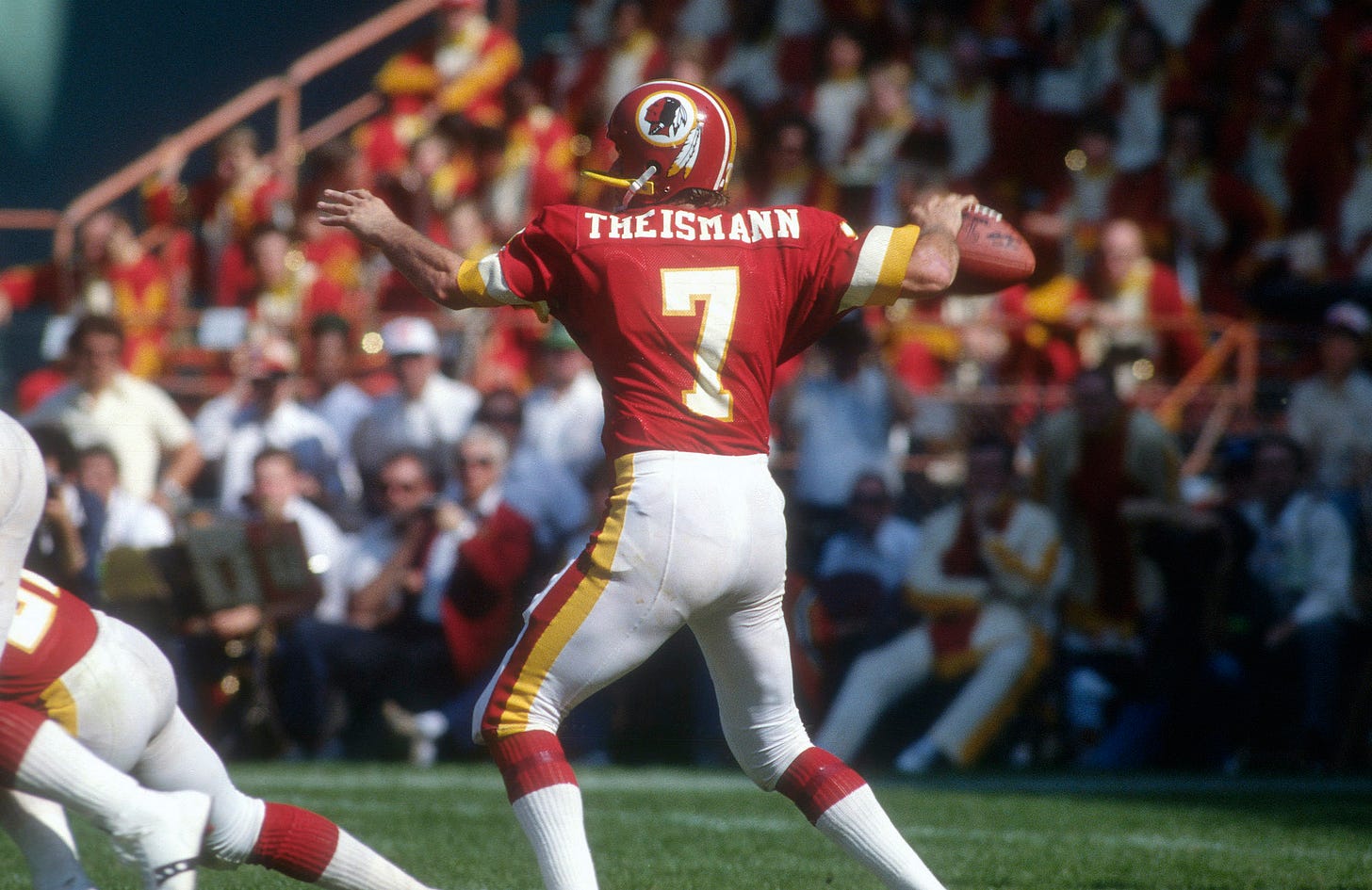

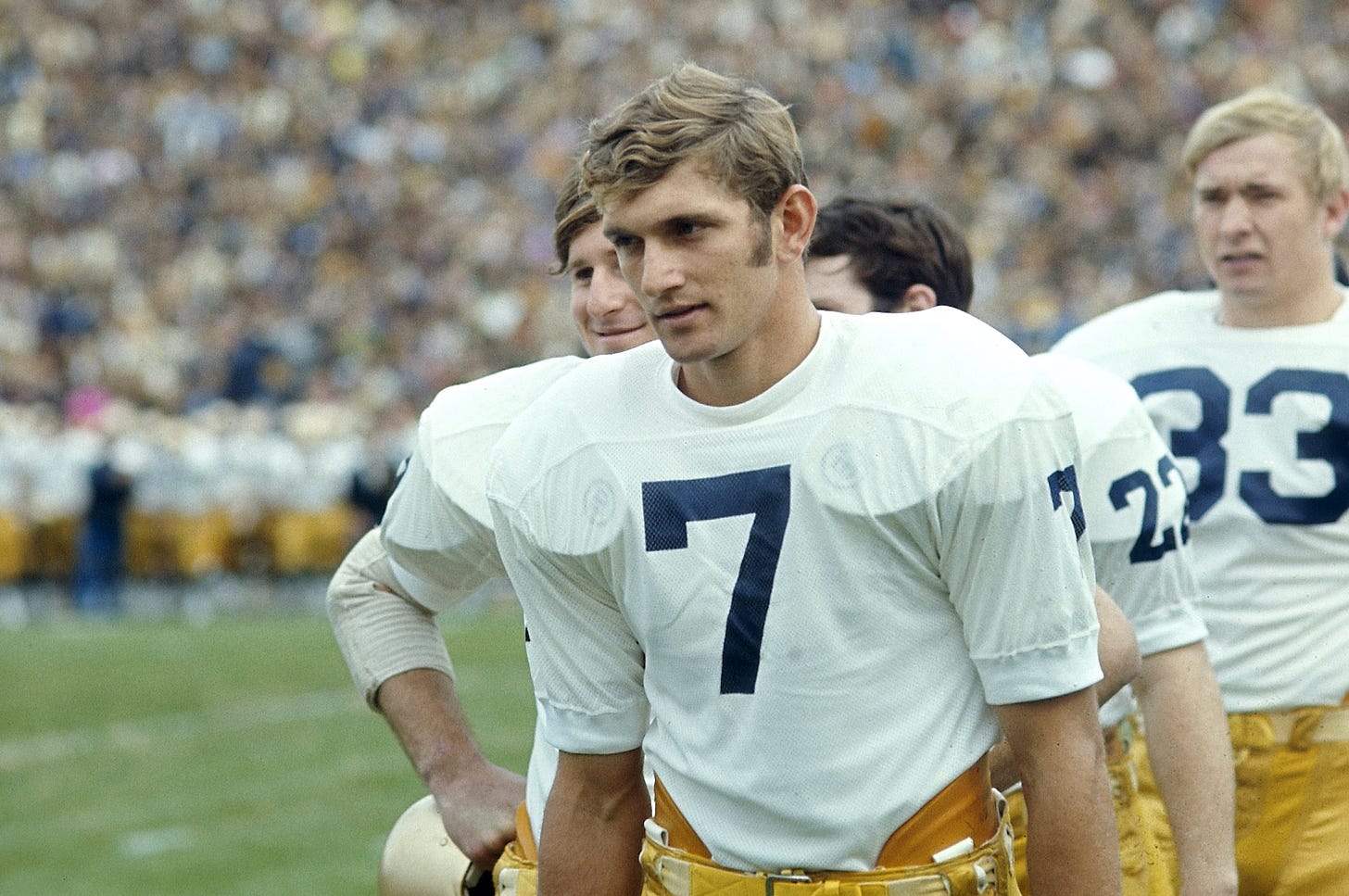
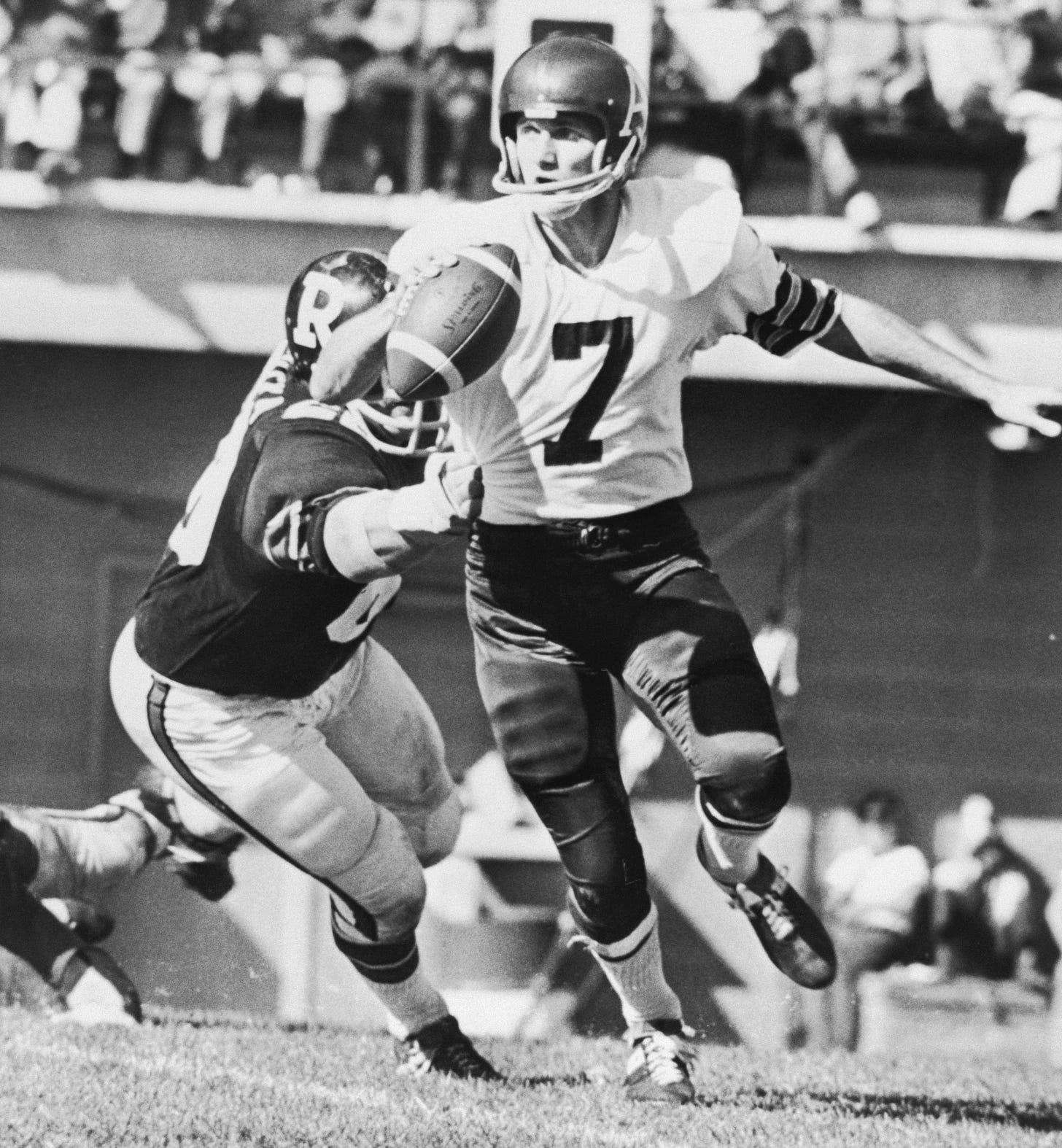
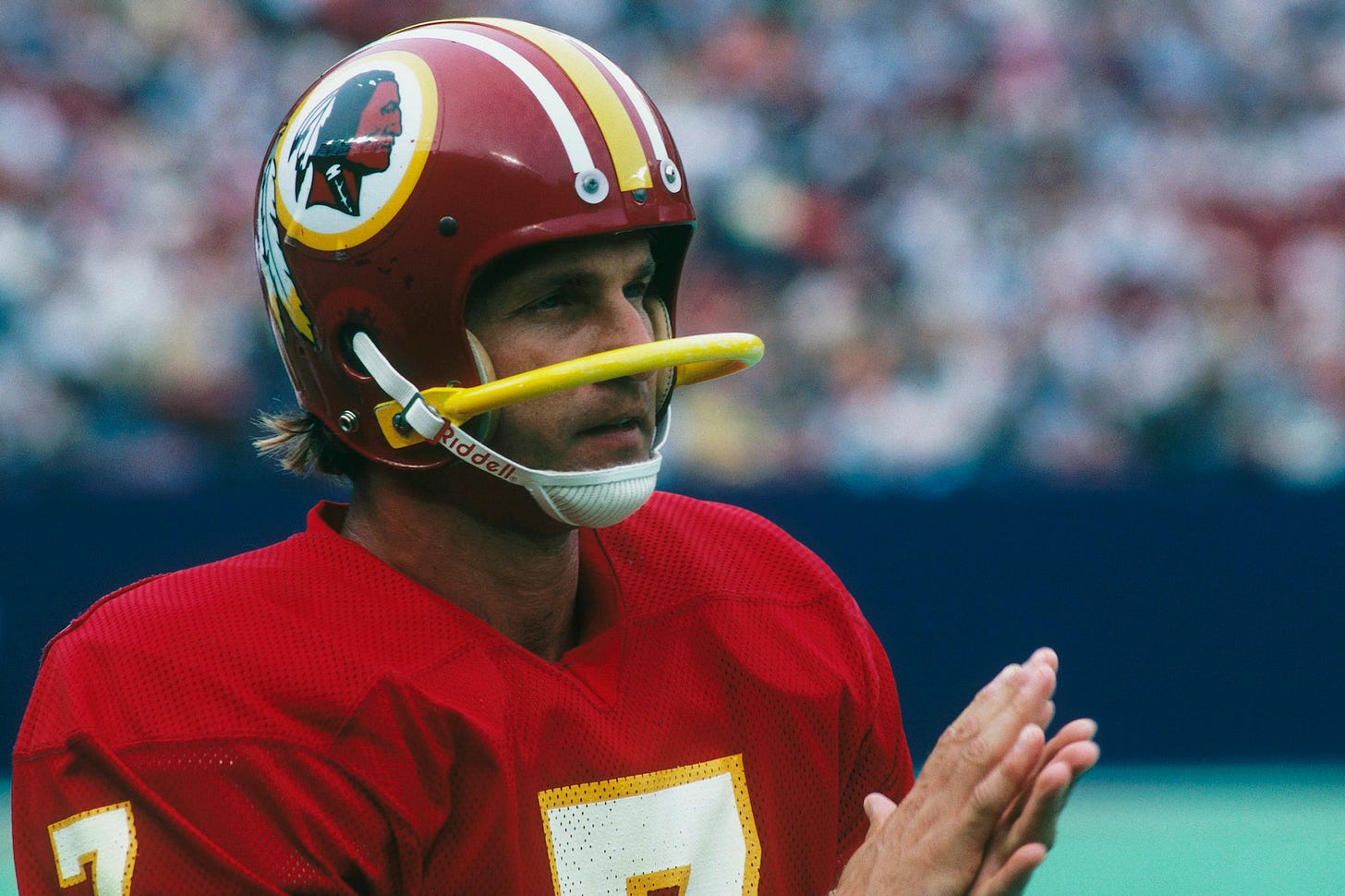


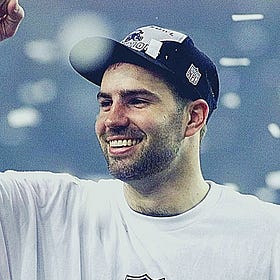


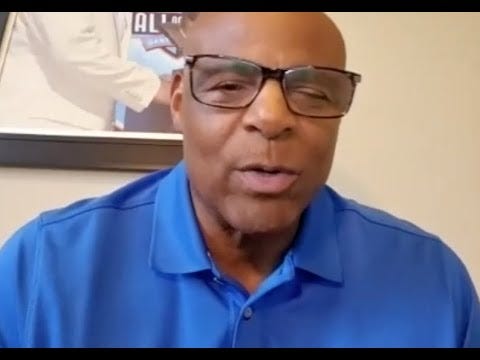
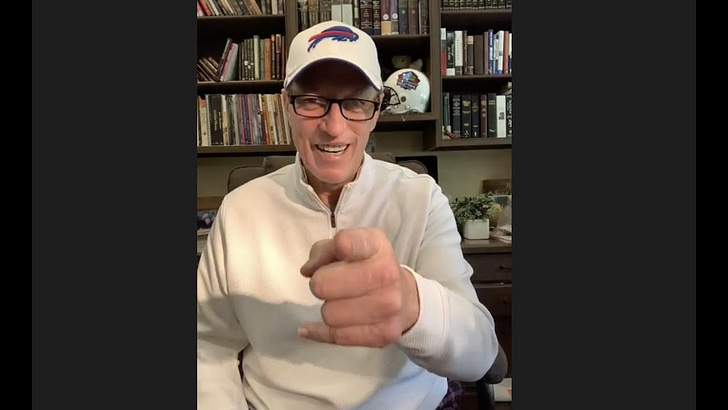

Great interview, liked him as a QB but have really come to appreciate Theismann and his loquaciousness as time has gone by. And thanks for transcribing this for those of us who like reading them.
Fantastic interview! I have many great memories of watching Joe's Redskins battle the NFC while Summerall and Madden called the game from RFK.
If you get a chance to watch the America's Game about Joe, you won't be disappointed. That's a big get Tyler!